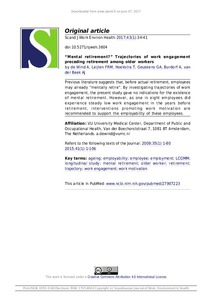“Mental retirement?”: trajectories of work engagement preceding retirement among older workers

de Wind, Astrid ; Leijten, Fenna R.M. ; Hoekstra, Trynke ; Geuskens, Goedele A. ; Burdorf, Alex ; van der Beek, Allard J.
Scandinavian Journal of Work, Environment and Health
2017
43
1
34-41
motivation ; older worker ; retirement ; work attitude
Older people
http://dx.doi.org/10.5271/sjweh.3604
English
Bibliogr.
"Objectives
Before actual retirement, employees may already distance themselves from work, which could be referred to as “mental retirement”. However, trajectories of work motivation, ie, work engagement, have not been studied yet. The present study aimed to (i) identify different trajectories of work engagement among older workers approaching the retirement age, and (ii) examine their associations with actual retirement.
Methods
In total 3171 employees aged 55–62 years, who participated in the Dutch Study on Transitions in Employment, Ability and Motivation were included in this study. Participants completed questionnaires in 2010, 2011, 2012, and 2013. Latent class growth mixture modeling was performed to identify groups of employees with similar three-year trajectories in work engagement. Logistic regression analyses were performed to study whether trajectory membership was associated with retirement.
Results
Of the 3171 employees, 16.2% made a transition from work to (early) retirement (N=513). Four trajectories of work engagement were identified: steady high (76.3%), steady low (12.7%), decreasing (6.2%), and increasing (4.8%). A steady low work engagement trajectory was associated with retirement [odds ratio (OR) 1.46], compared to a steady high work engagement trajectory. Although not statistically significant, an increasing work engagement trajectory seemed to be associated with retirement as well (OR 1.60).
Conclusions
This study did not support the concept of mental retirement before actual retirement, ie, a decrease in work engagement among those facing retirement. However, as one in eight employees did experience steady low work engagement in the years before retirement, interventions promoting work motivation are recommended to support the employability of these employees."
Digital
The ETUI is co-funded by the European Union. Views and opinions expressed are however those of the author(s) only and do not necessarily reflect those of the European Union or the ETUI.